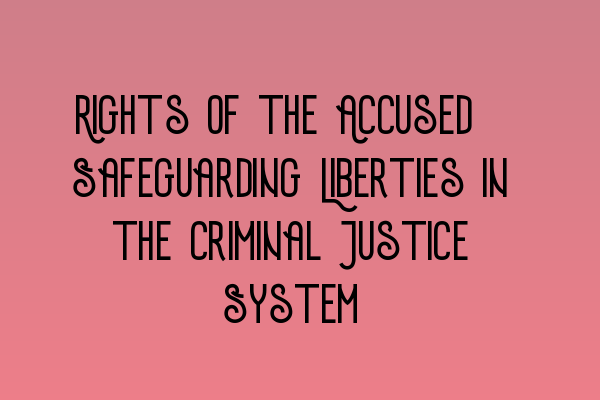Rights of the Accused: Safeguarding Liberties in the Criminal Justice System
In the criminal justice system, individuals accused of crimes have certain rights that are essential to ensuring a fair and just legal process. These rights are designed to safeguard the liberties of the accused and prevent any abuse or violation of their fundamental rights. Understanding these rights is crucial for both legal professionals and individuals facing criminal charges.
The Right to Legal Representation
One of the fundamental rights of the accused is the right to legal representation. This means that every individual has the right to be represented by a qualified lawyer who will advocate for their interests throughout the legal proceedings. Hiring a skilled criminal defense attorney can make a significant difference in the outcome of a case.
For those preparing for the SQE 1 exam, it is essential to have a solid understanding of this right. Practice exam questions and mocks, such as the ones available in the SQE 1 Practice Exam Questions and SQE 1 Practice Mocks FLK1 FLK2 articles, can help aspiring solicitors assess and enhance their knowledge in this area.
The Right to a Fair Trial
Another crucial element of the criminal justice system is the right to a fair trial. This includes the right to be presumed innocent until proven guilty, the right to examine and challenge evidence, the right to call and cross-examine witnesses, and the right to present a defense. A fair trial is essential for ensuring justice and preventing wrongful convictions.
To prepare for the SQE 2 exam, individuals can enroll in SQE 2 Preparation Courses that cover various aspects of criminal law and practice. These courses provide comprehensive training to future solicitors, helping them develop the necessary skills and knowledge to protect the rights of the accused during trial proceedings.
The Right to Due Process
The right to due process guarantees that the accused will receive a fair and impartial hearing in court. This includes the right to be informed of the charges, the right to be present during all critical stages of the proceedings, the right to challenge evidence, and the right to an unbiased judge. Due process ensures that individuals are not subjected to arbitrary or unfair treatment.
For aspiring solicitors preparing for the SQE 1 exam, it is crucial to familiarize themselves with key concepts related to due process. SQE 1 Preparation Courses, such as the ones available at SQE 1 Preparation Courses, provide comprehensive study materials, including case studies and practical examples, to help students grasp the importance of due process rights.
The Right to Appeal
If found guilty, individuals have the right to appeal their conviction and sentence. The appeals process allows individuals to challenge legal errors, misconduct, or new evidence that may have a material impact on the outcome of their case. The right to appeal ensures that any potential miscarriage of justice can be corrected.
SRA SQE Exam Dates play a crucial role for aspiring solicitors, as they need to plan their preparation and exam schedule effectively. Keeping track of important dates and deadlines is essential to avoid missing out on opportunities for improvement.
In conclusion, safeguarding the liberties of the accused is a fundamental principle of the criminal justice system. Understanding and upholding the rights of the accused is a crucial responsibility for legal professionals, like those at SQE Criminal Law & Practice Law UK. By respecting these rights, we contribute to the fair and just administration of justice.
Find out more about SQE exams and enhance your knowledge of criminal law and practice by exploring the related articles and resources provided by SQE Criminal Law & Practice Law UK:
